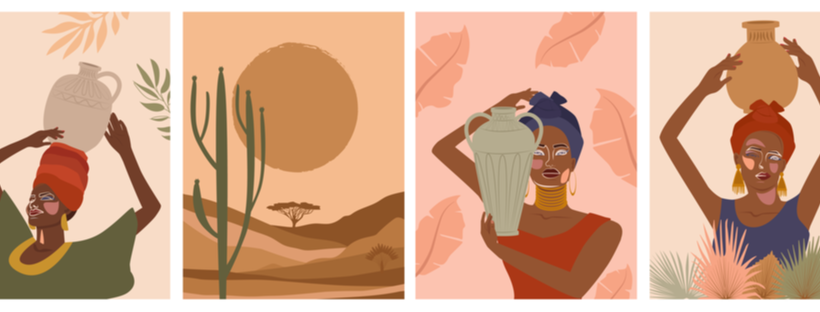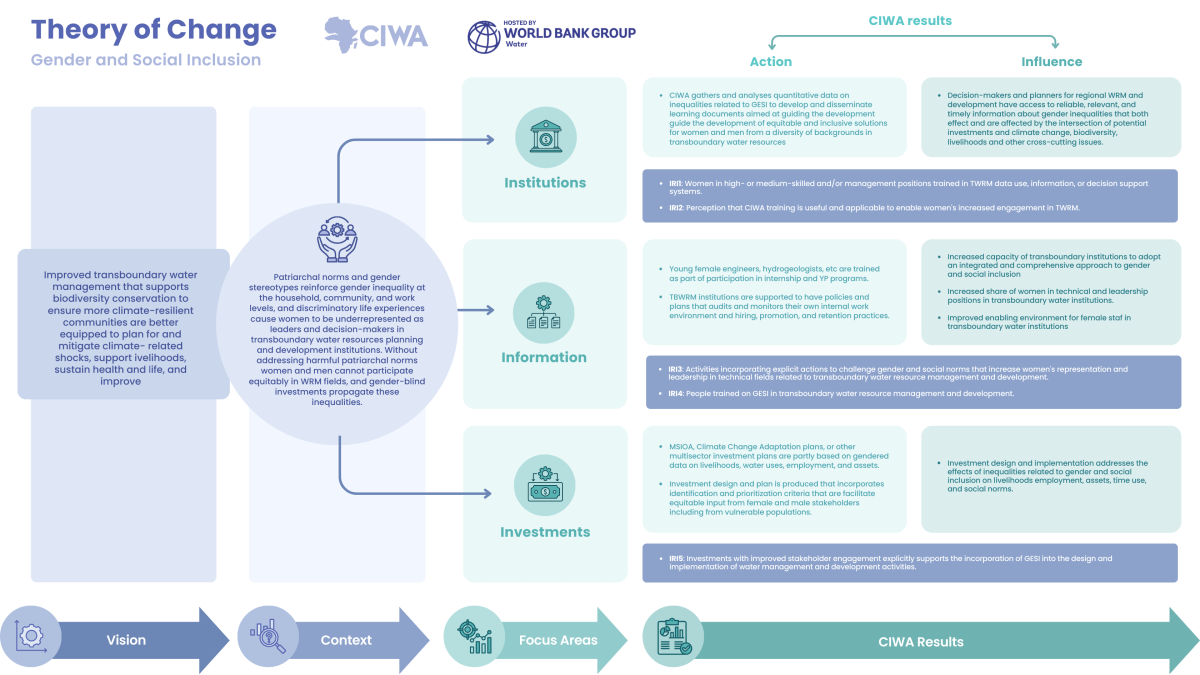Gender and social inclusion
What does GESI mean?
CIWA is working for a world with gender equality, which means changing the norms and expectations about female and male roles and changing power relations within governments, companies, institutions, and households.
It is also working to improve social inclusion and the dignity of people who are disadvantaged because of their identity so they can participate fully and equally in society. Social Inclusion assumes that men and women are not homogeneous but are stratified by age, race, religion, ethnic origin, beliefs and practices, and socio-cultural contexts.

UNDERSTANDING GENDER AND SOCIAL INCLUSION
Gender is:
- About women, girls, men, and boys, and the associated norms, behaviors, and roles as well as the relationships among these groups. Gender is considered to be a social construct and its definition can vary among societies and change over time. CIWA wishes to adopt a gender-inclusive approach that recognizes that some people prefer to use non-binary terms to identify themselves.
Gender is not:
- Only about women and girls: Men and boys should also be part of the GESI equation
- Only women’s responsibility: For real change to happen, everyone needs to be involved
- A Western or foreign concept: Gender equality is a global goal articulated in national, regional, and international commitments and treaties to which many countries worldwide are signatories
- An attempt to take away the rights of men and boys: Human Rights are universal, which means that they apply to all human beings
- Only an issue for gender specialists: Relying solely on gender specialists cannot tackle the main drivers of gender inequality and social exclusion. Everyone needs to be involved and committed to equality and inclusiveness.
PURPOSE
CIWA’s new Gender and Social Inclusion (GESI) Framework will guide its operations to ensure that CIWA works to improve gender equality throughout the management of water resources and development of water infrastructure projects. CIWA’s Gender and Social Inclusion (GESI) Framework highlights CIWA’s approach and commitment to integrating gender and social inclusion considerations within the context of transboundary water management in sub-Saharan Africa. Highlighting the importance of ensuring that GESI considerations are applied across multiple sectors and multiple layers where CIWA works, the framework seeks to contribute towards transformative change to achieve gender equality and social inclusion.
APPROACH
The framework:
- Builds upon lessons learned to apply a gender and social inclusion lens within the context of transboundary water management;
- Provides a strategic focus to scale up GESI across the different levels and sectors where CIWA works;
- Articulates key action points for CIWA to take to advance gender equality and social inclusion; and
- Reinforces the World Bank Group’s commitment to gender and social inclusion as articulated in its Gender Strategy (FY2016-2023).
The GESI Framework builds upon the evolution of gender thinking globally as well as drawing upon the findings and lessons learned from a baseline study on CIWA’s performance on gender and social inclusion undertaken in 2020. A literature review, online surveys, and consultations with CIWA staff, country and development partners contributed to the formulation of the framework. It also builds upon experiences and learning from CIWA’s existing efforts to promote and support integrating GESI aspects into its work.
THEORY OF CHANGE
EXPECTED RESULTS
Water resource management, sustainable development, and gender are interlinked and must be addressed in a holistic manner. CIWA is working to integrate GESI throughout the project cycle and at all levels and sectors of transboundary institutions. Gender-transformative approaches should be based on deep gender analysis and understanding of local and institutional contexts. Ensuring that all staff and partners apply a GESI lens to the work within the transboundary water context is critical to CIWA’s commitment to facilitating equal opportunities for women and other vulnerable populations that operate within the areas where CIWA works.
KEY POINTS:
1. Adopt an integrated and comprehensive approach to gender and social inclusion
2. Strengthen internal and partner capacity on gender and social inclusion
3. Bridge GESI knowledge and data gaps
4. Ensure monitoring and evaluation is sensitive to gender and social inclusion.
DISCOVER OUR PUBLICATIONS ON GESI
World Bank Gender Strategy 2016-2023
CIWA Social Inclusion Tool Kit
Ensuring Gender and Social Inclusion is Considered at the Project Concept Phase



